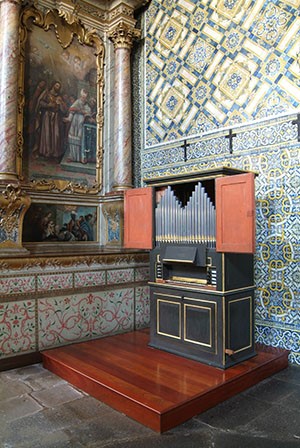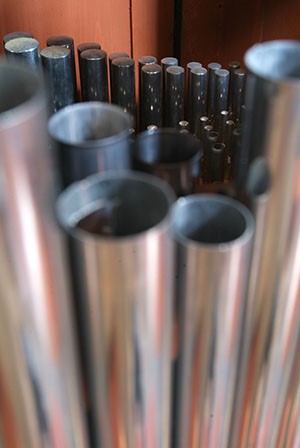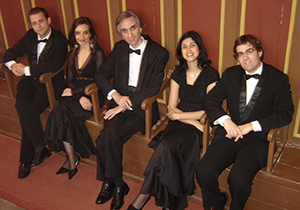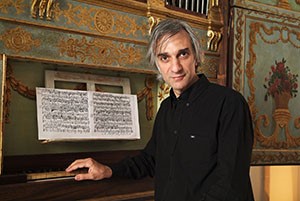 Sunday, 30 October, 9.30, p.m.,
Sunday, 30 October, 9.30, p.m.,
Igreja e Convento de Santa Clara (Funchal)
António Carreira and Frei António Carreira
Capella Patriarchal
João Vaz, organ and direction
António Carreira and Frei António Carreira
The figures of António Carreira “the Elder” and his son Frei António Carreira have a place of indisputable importance in the history of 16th century Portuguese music. António Carreira, chapel master in Lisbon, was the most important Portuguese organ composer of the century. His works for keyboard – some of which will be heard in this concert, on the magnificent historical instrument of the Church of the Convent of Santa Clara – are preserved in the Library of the University of Coimbra (P-Cug MM 242). This library also houses some of the composer’s vocal works, such as, for example, the Stabat Mater (P-Cug MM 48), which will close today’s programme. Frei António Carreira was an Augustinian monk, and died at the Monastery of Graça in Lisbon, a victim of the plague, in 1599. He wrote a number of vocal works intended for the liturgy of Holy Week, which are found in the so-called “Book of São Vicente”, now in the Archive of the Patriarchal Cathedral of Lisbon (P-Lf FSVL 1P/H-6). This manuscript – unfortunately mutilated probably on account of the separate sale of some dozens of pages – is structured as a book for Holy Saturday and is one of the most important documents of late renaissance polyphonic practice in Portugal. The Responsories for Holy Thursday and the Ferial Mass, which will be heard today, were first heard in modern times in the New Year Concerts of the Patriarchate of Lisbon in 2014. Frei António Carreira planned an edition of his father’s works, a project that he unfortunately did not manage to complete, probably on account of his premature death.
João Vaz
António Carreira (a.1540 - a.1597)
¬ Sexti toni, fantasia a quatro
¬ Canção a quatro glosada
¬ Tento com cantus firmus sobre «Con que la lavaré»*
¬ Fantasia a quatro em Ré
¬ Fantasia a quatro em Lá-Ré
Frei António Carreira (c.1550/55 - 1599)
¬ Responsories for Holy Week
› I – In monte oliveti
› II – Tristis est anima mea
› III – Ecce vidimus eum
› IV – Amicus meus
› V – Judas mercator pessimus
› VI – Unus ex discipulos
› VII – Eram quasi agnus
› VIII – Una hora
› IX – Seniores populi
¬ Ferial mass a 4
› Kyrie
› Sanctus
› Benedictus
› Agnus Dei
› Deo gratias
António Carreira
¬ Stabat Mater
Capella Patriarchal
Mónica Santos, soprano
Carolina Figueiredo, contralto
João Rodrigues, tenor
Manuel Rebelo, bass
João Vaz, organ and direction
Participants
|
Of recent foundation, but having given already a number of concerts in Portugal, Spain and Germany, this ensemble’s objective is primarily the performance of the treasures of Portuguese sacred music. It frequently performs unpublished music, taking special care in the necessary research into musical sources beforehand, as well as making a particular effort to observe the performance practices of different periods. The presence of the organ allows not only the performance of works in which the instrument has an obbligato part or a basso continuo, but also earlier repertoire, according to the tradition of vocal polyphony accompanied by the organ or other instruments. Having its origins in the work of João Vaz in Portuguese organ music of the 16th – 19th centuries, through the direct study of sources, it includes vocal music, collaborating with singers who have specialized in this kind of repertoire. |
|
Born in Lisbon, João Vaz graduated in organ from the Higher School of Music in Lisbon, studying with Antoine Sibertin-Blanc, and from the Higher Conservatoire of Aragon, in Zaragoza, where he studies with José Luis González Uriol, on a scholarship from the Gulbenkian Foundation. He has a doctorate in music and musicology from the University of Évora, where his thesis, on Portuguese organ music from the end of the ancien regime was supervised by Rui Vieira Nery. He has been extremely active internationally, both as a performer and as a teacher on organ courses, and as a jury member in competitions. He has made more than ten solo recordings, significant among them those made on historical Portuguese organs. As performer and musicologist he has paid particular attention to Portuguese sacred music, founding in 2006 the ensemble Capella Patriarchal, which he directs. His work in transcribing and editing, which he has been published in Portugal and Spain, covers works preserved in various Portuguese libraries and archives. He currently teaches organ at the Higher School of Music in Lisbon. He is artistic director of the Madeira Organ Festival and of the concert series featuring the six organs of the Basilica of the National Palace of Mafra (for the restoration of which he was a permanent consultant) and of the historical organ of the Church of São Vicente de Fora in Lisbon, of which he became titular organist in 1997. |
Notes about the organ
 Church and Convent of Santa Clara, Funchal
Church and Convent of Santa Clara, Funchal
The church of Santa Clara had acquired a small positive organ with Italo-Iberian characteristics in the 18th century. With the extinction of the religious orders and the subsequent sale of the congregation’s goods, the organ was also put up for sale, being purchased by a certain Romano de Santa Clara, who kept it in a wing of the dissolved convent. In 1921 he gave it to the fraternity of Santa Clara, so that it could once more be put to service in the worship of the church. In October 1923 the task of ‘repairing’ it was put in the hands of the musicians César R. Nascimento and Guilherme H. Lino, who completed the work in November of the following year.
Unused and badly damaged for many years, this instrument of considerable historical value underwent a major restoration by Dinarte Machado on the basis of proper criteria drawn from a knowledge of the organ-building practices of the instrument’s period. This was completed in 2001. The poor state of the instrument, completely disfigured, required a rigorous, in-depth study on which to base this restoration. Thus we see how from the outset Dinarte Machado went to considerable pains in the course of this restoration.
Manual (C, D, E, F, G, A, Bb-c’’’)
Principale (c#’-c’’’)
Ottava (4’)
Quintadecima (2´)
Decimanona (1 1/3´)
Vigesimaseconda e Trigesimasesta
Flauto 8’
Flauto 4’
Cornetto (c#’-c’’’)

 João Vaz
João Vaz